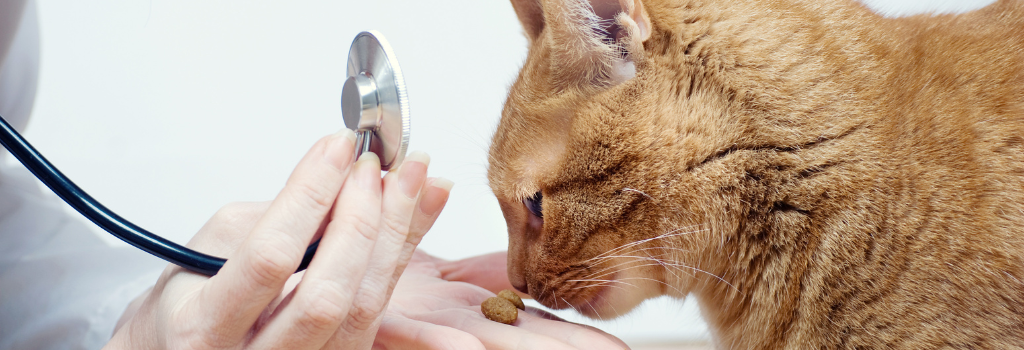.jpg)
Cat preventive care is essential for keeping your cat safe and healthy, extending their life and helping to avoid many potential illnesses. At Bridge Veterinary Hospital, we provide the highest quality preventive care to ensure your cat lives a long, happy life. In this article, we’ll cover what preventive care is, why it’s important, and what types of preventive care we recommend. We’ll also discuss how preventive care can help avoid serious conditions and why it’s important to avoid self-diagnosing your cat. Finally, we’ll discuss the risks of failing to provide preventive care for your cat.
What is Cat Preventive Care?
Cat preventive care is an essential aspect of pet ownership that aims to maintain the overall health and well-being of cats by taking preemptive actions and providing necessary care. This approach is crucial because it helps cats live longer, healthier lives by preventing illnesses and addressing potential health issues before they become severe.
Preventive care for cats includes: regular veterinary checkups, vaccinations, parasite prevention, nutrition and weight management, dental care, grooming, spaying/neutering, and environmental enrichment. The American Animal Hospital Association (AAHA) and the American Veterinary Medical Association (AVMA) have established guidelines for feline preventive healthcare, which include recommendations on the frequency of visits, health evaluations, diagnostic plans, therapeutic plans, prevention plans, and follow-up plans. Adhering to these guidelines ensures that cats receive the necessary care for their specific needs and promotes a healthy, happy life.
.jpg)
What are the Benefits of Cat Preventive Care?
Cat preventive care can provide numerous benefits for your pet. Regular veterinary visits and checkups allow for early detection of health issues, allowing them to be addressed before becoming more serious. Vaccinations can help protect cats against various diseases and infections. Parasite prevention and control is essential for maintaining your cat’s health and avoiding illnesses caused by parasites such as fleas, ticks, and worms. Spaying/neutering can decrease the risk of certain health issues, including reproductive cancers and infections, while also helping to control the cat population. Genetic testing can detect predispositions to various diseases and monitor early signs throughout your pet’s life to provide more personalized care. Maintaining a healthy weight is important for preventing obesity-related health issues such as diabetes, heart disease, and joint problems. Finally, dental care is necessary for avoiding infections, tooth loss, and other organ damage caused by poor oral hygiene. These are all examples and benefits of cat preventive care.
What types of preventive care do you recommend?
Once kittens get through the initial four-month stage, we don't see them back for their spay and neuter until about six to eight months. And the reason why we like to recommend that, especially if your cat's going outside, is it helps with population control. Spaying and neutering cats also help prevent cancer development in those reproductive organs later in life, whether it be mammary cancer, ovarian cancer, or testicular cancer. If we could go ahead and spay or neuter cats at a younger age, we would significantly reduce the chances of developing those cancers later on in life.
We also like to get younger cats and kittens started on parasite prevention. Some products are all-in-one in that they prevent fleas, ticks, intestinal parasites, and ear mites. Fleas can cause severe skin irritation and infest your home if you do not have a good preventive plan. While less common than fleas, ticks can transmit dangerous and even deadly diseases. Both indoor and outdoor cats are at risk for fleas and ticks, as these parasites can thrive in nearly all geographic locations. That’s why flea and tick control is such a pivotal part of any preventive care program for cats. Your veterinarian reassesses their flea and tick control products yearly to ensure they are safe and effective. They will work with you to find the safest and most effective product for your cat based on lifestyle.
One part of feline preventive care that people often forget about is bathing and grooming because we all know that cats are fastidious groomers. Through self-grooming, a cat can manage their own skin, fur, and digestive health. However, what many cat owners don’t realize is there are things you can and should do as a cat owner to ensure optimal hygiene.

A simple grooming preventive care regimen for your cat includes:
- Brushing your cat's hair regularly to limit knots and furballs (especially if you have a long-haired cat breed)
- Trimming your cat's claws
- Petting and playing to maintain a healthy comfort level with interaction and to enrich the cat’s senses
If you have trouble doing any of these things, reach out to your veterinarian for advice. Also, remember to keep in mind that if a cat that is usually an excellent groomer begins not grooming or doing things like going outside the litter box, these could be indications that your cat is sick. Always err on the side of caution and contact your veterinarian.
Annual wellness exams are also critical to your cat’s health and likely the most essential part of preventive care. During these exams, we get their vaccines up to date, make sure everything looks good, their bellies feel good, and their teeth and gums look healthy. And usually, starting around age three, we begin running some general lab or blood work to ensure that everything internally looks okay. Because as we know, as any pet ages, they can develop some things like kidney or liver disease, or maybe some things are going on with their thyroid, and we want to make sure that we're keeping them happy and healthy for as long as possible.
Another part of preventive care that people might not realize is such a critical facet of a good regimen is cat nutrition. Raising a healthy cat depends heavily on the type and amount of food they consume on a daily basis. Low-quality cat food and treats high in fat or carbohydrates can negatively affect many aspects of your cats health. Feline obesity is the most common health problem we see in our otherwise healthy cat patients. Developing a nutritional plan from the kitten stage that includes a diet selection, a feeding plan, and an exercise plan is the best way to avoid feline obesity. Cats will have different nutritional requirements during each stage of their lives which include:
- Kittens
- Adult Cats
- Senior cats
- In addition, there are health conditions that require special diets
Your veterinarian will consider lifestyle and your cat’s current condition when helping you to tailor your cat’s diet—including prescribed feeding frequency and serving size. In general, we recommend high-quality canned food as the primary source of nutrition. However, some kibble in the diet may be fine. Most cats will overeat if you allow them to free feed, which is why you need to be in charge of feeding them the proper amount and then picking it up when they are finished.
Last but certainly not least is cat dental care, which is often the most neglected part of preventive care in felines. Again, cats do not tell you when they have oral pain or discomfort. And by four years of age, most cats have developed some dental or gingival disease that will require veterinary intervention. We also need anesthesia and dental x-rays to do a thorough exam on your cat, as most dental disease in cats lies underneath the gum line. X-rays can show us the root of the cat’s tooth, which is often where the issues are that cause the cat pain.
Some of the causes of dental disease and discomfort in cats include:
- Periodontal Disease
- Gum Disease
- Tooth Loss
- Mouth Sores and Ulcers
- Gingivitis
- Malocclusion
While an ultra-thorough cleaning of your cat’s teeth is something you should trust with your veterinarian, you can also regularly brush them at home too. Many cats will tolerate daily teeth brushing if you are gentle, and your veterinarian would be happy to share some tips on how to do so. You can also help facilitate excellent cat health by following the steps for excellent cat dental care and providing toys and treats formulated to help strengthen and/or clean your cat's teeth and gums.
How Does Cat Preventive Care Provide Cost Savings?
Preventive care leads to substantial cost savings for cat owners. By being proactive and investing in preventive healthcare, you can potentially lower your long-term veterinary costs while ensuring the health and well-being of your pet. Preventive care helps significantly in detecting medical issues early, before they are advanced. Advanced ailments are often more expensive to treat than early-stage disease, as they may require surgical procedures or diagnostics.
.jpg)
Why is it Important to Avoid Self-Diagnosing My Cat?
Cats are unique animals that have retained the behaviors of their wild ancestors, making them solitary survivors. They are territorial animals, and their behavior is closely linked to their physical and emotional health. Identifying and understanding these behaviors can prevent further health complications and ensure a better quality of life for the cat. It’s important to recognize that cats can hide signs of illness or pain, so observing your pet’s behavior isn’t enough to detect potential health issues. Seeking professional veterinary care is the best way to ensure your pet receives the appropriate care and treatment they need.
What are the Risks of Failing to Provide Preventive Care?
Failing to provide preventive care for a cat can lead to a range of health issues, some of which may be life-threatening. Neglecting preventive care can result in broken teeth and infected gums, while also putting pets and their owners at risk of internal parasites, external parasites, Lyme disease, flea allergic dermatitis, tapeworms, heartworms, and various illnesses caused by bacteria or viruses. Early detection of health issues through routine veterinary visits is essential for ensuring the health and well-being of pets. By making preventive care a priority and adhering to AAHA/AVMA guidelines for feline healthcare, pet owners can ensure that their furry family members live long, healthy lives.
Conclusion
Preventive care is essential for cats’ health and longevity. Regular check-ups, vaccinations, parasite prevention, nutrition and weight management, dental care, grooming, spaying/neutering, and environmental enrichment are all important aspects of preventive healthcare. By providing the necessary care and attention to your pet, you can help them live a long and fulfilling life. At Bridge Veterinary Hospital, we offer comprehensive preventive care services to ensure that pets receive the best possible care. If you live in or near Point Pleasant, NJ, contact us today at (567) 361-3407 to set an appointment or if you have any questions about cat preventive care.

